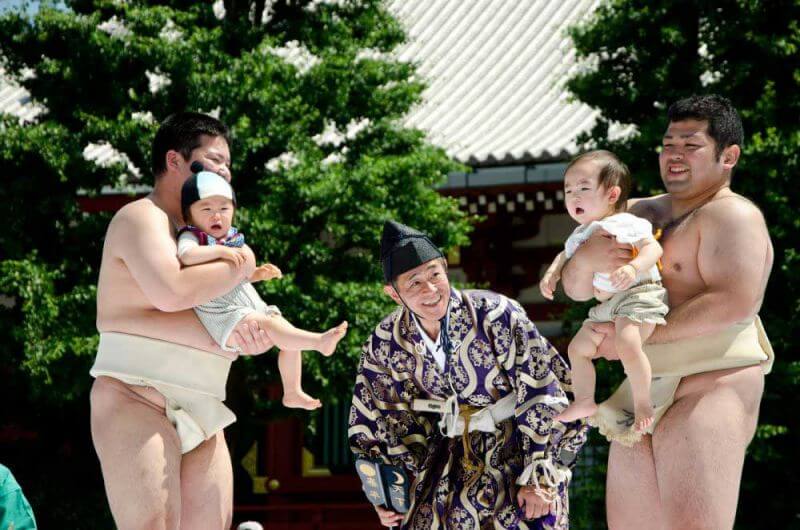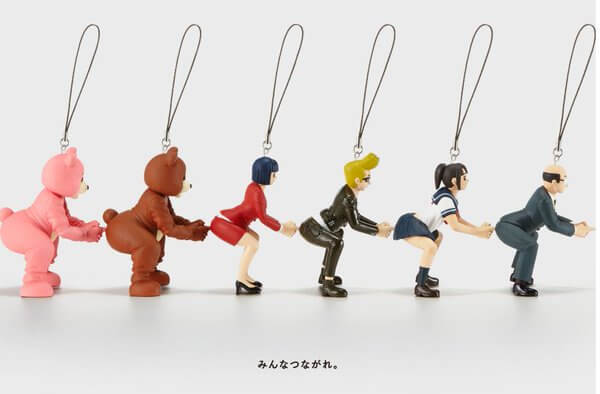Japan is one of the leading countries in terms of technology and innovation. It's the birthplace of comics, cartoons and 'Hello Kitty'. Currently, Japan also has many special traditions and vibrant culture. The culture here is strange to newbies so if you are looking for a business then we recommend you seek out professional Japanese localization services.
But don't worry because we're here to help. We have selected a few of the many “odd customs” you may encounter in Japan.
10 Things About Japanese Culture You Probably Didn't Know.
1. Naki Sumo . Contest
The Naki Sumo ('Children's Cry') Competition is a festival where parents give their babies to sumo wrestlers with the ultimate aim of scaring the kids and making them struggle by wearing scary masks, or shouting at babies. This contest has a long tradition, and the sobs of babies are said to scare away nearby demons and bring good luck to the baby with the loudest cry.

2. Hard Work Means Good Sleep
In Japan, sleeping on the job is not only acceptable but commendable. The Japanese believe that sleeping at work or at school means you have worked very hard. This fact is also known as inemuri. Some companies even have specially scheduled naps for their employees “Announcement! Time to take a nap in the HR room!”
3. Don't Tie Money
Not tipping is a strange thing for foreigners visiting Japan, but it is considered rude if you "tip" a waiter, delivery man or any other employee. They get offended when you give more money for a service that is already covered by the bill or the price. So drop your cash and “NO TIP” in Japan. That is extremely impolite.
Note: Top 11 Localization Basic Notes You Need to Know
4. Kancho
Have you ever sucked your finger and put it in your ear? Remember it's that wet, sticky, uncomfortable feeling in the ear, but imagine it in the butt. You can get pranked this way in Japan. This is called the Kancho prank and involves holding hands together in the shape of a gun and sticking fingers protruding at the back of an innocent victim. They will not undress you but do it through the clothes. Pay attention to your back and protect your back.

5. Always Kampai
When served drinks at a dinner party, you shouldn't toss your glass right away, no matter how thirsty you are. You have to wait until everyone is served. Then someone gives a speech or toasts and exclaims 'Kampai!'. It's also an old saying and you have to answer kampai too. If you don't say so, it will be considered rude. Then you can drink. Another notable eating ritual is that you can sip, especially if it's instant noodles. It shows you are enjoying your meal.
6. Burn Them, Burn Them!
During Tet in Japan, people buy a lot of lucky charms to bring them good luck and fortune. And it is considered bad luck to keep these decorations for more than a year. Don't throw them away because that's also bad luck. They are very fond of lucky things but instead they are gathered and burned in the wonderful festival called Dondo Yaki.
Note: How Translation And Culture Are Connected
7. You Have To Bow.. A Lot
The Japanese come with their greetings with a lot of bowing. Bowing is very important in Japan, and there are many different methods for each occasion and person. Respect for Japanese values, and historically, bowing meant putting oneself in a position of vulnerability in front of others – the ultimate symbol of trust and respect. Bowing can vary from a light bow to friends and classmates to a deep bow to superiors.

8. Christmas KFC
Christmas is a time of magic, lights, and snow, and in Japan, it's a time when people line up at local KFC fast food outlets. Now, it's customary for families to treat themselves to a box of luxury KFC fried chicken, or you have to be super lucky to find a good turkey.
In other cultures, bringing home fast food during Yule season might make you angry and nagging, but in Japan, you've been hugged. The custom started when a KFC manager overheard foreigners talking about how they missed a lovely turkey at Christmas (turkeys are not common in Japan) and thought a substitute great would be a special carton of Christmas fried chicken.
9. Isolation Work
Japan has strict labor laws. If a company wishes to fire an employee, it is authorized by law to offer a substantial severance package to the fired employee, especially if there is no reason for the dismissal.
This has become a problem for companies in Japan, who need to lay off certain workers but don't want to pay cash. To solve this, they put such employees in isolation rooms and told them to do monotonous and disturbing jobs. This is in the hope that they will soon get bored and quit. Voluntary severance means no severance package, which is good for the company's budget.
Note: Top 05 Japanese Translation Companies in Da Nang
10. Students Self-Cleaning

There are no gatekeepers in Japanese schools. Unlike most Western schools, Japanese students are the ones responsible for keeping the school and its surroundings clean. Sometimes this is extended beyond schools. Several times a year, students will go down to the neighborhood where their school is located and do a complete cleanup. This tradition is to foster a sense of responsibility in young children and teach them to care about the environment and those around them.
There are so many other weird and interesting Japanese customs that we could spend all day talking about. You can choose to be in Japan when discussing your next vacation and experiencing the culture first-hand. If you decide to go, remember to speed up the hand game and enjoy it!
You are viewing the article Special Features of Japanese Culture of Idichthuat. Hope this article will bring you a lot of useful knowledge when learning about Japanese culture. If you have a need for Japanese translation Please contact us for the best support.
Contact us today for the fastest service quote and consultation.
| ✔️ See more related information: | 👉 Reliable, Cheap, Professional Swedish Translation Chuyên |
| 👉 The Most Professional Electronic Translation | |
| 👉 Quick Translation of Seafood Documents | |

Nguyen Trung Khang - Talented interpreter and translator, passionate about translation
Nguyen Trung Khang is a talented interpreter and translator, with many years of experience in the field of translation and linguistics. He graduated from Ho Chi Minh City University of Education, majoring in Linguistics in 2015.
After graduating, Mr. Khang participated in a professional interpretation and interpretation training course at the University of Foreign Languages - Hanoi National University. He achieved a high-level certificate in interpreting and interpreting, and was also awarded a master's degree in linguistics.